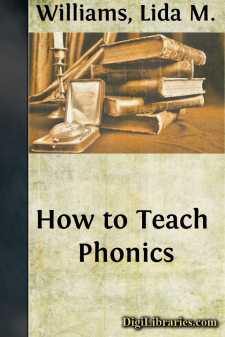Language Arts & Disciplines
Language Arts & Disciplines Books
Sort by:
Lau is the name given to the language spoken by the inhabitants of the artificial islets which lie off the northeast coast of Big Malaita, Solomon Islands. The language spoken on the coast from Uru on the northeast to Langalanga, Alite Harbor, on the northwest of Big Malaita, is practically Lau. On the west coast there is considerable admixture of Fiu, which is the language of the bush behind the...
more...
by:
Buckingham Smith
PART I: ORTHOGRAPHY. It has been thought proper to use nineteen characters in the language, among which are not included f, j, k, w, x, y, nor l, although the sound of l is somewhat heard in the soft enunciation given by the Indian to the letter r. The k is sufficiently supplied in the syllabic sounds que and qui, where the u is silent, although gue and gui are each of two syllables. There has been a...
more...
by:
Edmund Luce
The aim of the present book is to help boys to translate at sight. Of the many books of unseen translation in general use few exhibit continuity of plan as regards the subject-matter, or give any help beyond a short heading. The average boy, unequal to the task before him, is forced to draw largely upon his own invention, and the master, in correcting written unseens, has seldom leisure to do more than...
more...
by:
Duchess
To sit down in cold blood and deliberately set to cudgel one's brains with a view to dragging from them a plot wherewith to make a book is (I have been told) the habit of some writers, and those of no small reputation. Happy people! What powers of concentration must be theirs! What a belief in themselves—that most desirable of all beliefs, that sweet propeller toward the temple of fame. Have...
more...
by:
Joseph Devlin
CHAPTER I REQUIREMENTS OF SPEECH Vocabulary—Parts of Speech—Requisites It is very easy to learn how to speak and write correctly, as for all purposes of ordinary conversation and communication, only about 2,000 different words are required. The mastery of just twenty hundred words, the knowing where to place them, will make us not masters of the English language, but masters of correct speaking and...
more...
by:
Lida M. Williams
LEARNING TO READ Every sound and pedagogical method of teaching reading must include two basic principles. 1. Reading must begin in the life of the child, with real thought content. Whether the thought unit be a word, a sentence, or a story, it must represent some idea or image that appeals to the child's interests and adjusts itself to his experience. 2. It must proceed with a mastery of not only...
more...
PREFACE. Almost every English boy can be taught to write clearly, so far at least as clearness depends upon the arrangement of words. Force, elegance, and variety of style are more difficult to teach, and far more difficult to learn; but clear writing can be reduced to rules. To teach the art of writing clearly is the main object of these Rules and Exercises. Ambiguity may arise, not only from bad...
more...
CHAPTER I THE FIELD FOR SPECIAL ARTICLES Origin of Special Articles. The rise of popular magazines and of magazine sections of daily newspapers during the last thirty years has resulted in a type of writing known as the "special feature article." Such articles, presenting interesting and timely subjects in popular form, are designed to attract a class of readers that were not reached by the...
more...
CHAPTER I ABOUT NOSES AND JAWS A foxhound scents the trail of his game and tracks it straight to a killing. A lapdog lacks this capability. In the same way, there are breeds of would-be writers who never can acquire a "nose for news," and others who, from the first day that they set foot in editorial rooms, are hot on the trail that leads to billboard headlines on the front page of a newspaper...
more...
by:
Edward Sapir
I Introductory: Language Defined Speech is so familiar a feature of daily life that we rarely pause to define it. It seems as natural to man as walking, and only less so than breathing. Yet it needs but a moment’s reflection to convince us that this naturalness of speech is but an illusory feeling. The process of acquiring speech is, in sober fact, an utterly different sort of thing from the process...
more...











